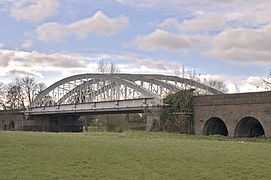Windsor Railway Bridge
| Windsor Railway Bridge | |
|---|---|
 The wrought iron railway bridge. (Picture shows downstream side, looking towards Windsor.) | |
| Carries | Slough to Windsor & Eton Line |
| Crosses | River Thames |
| Locale | Windsor |
| Characteristics | |
| Design | Bow and string |
| Material | Wrought Iron |
| Width | 202 feet (62 m)[1] |
| Height | 17 feet 9 inches (5.41 m)[2] |
| Number of spans | 1 |
| History | |
| Designer | Brunel |
| Opened | 1849[1] |

Windsor Railway Bridge is a wrought iron 'bow and string' bridge in Windsor, Berkshire, designed by Isambard Kingdom Brunel. It carries the ex-GWR branch line from Slough to Windsor into Windsor and Eton Central station. It crosses the River Thames on the reach between Romney Lock and Boveney Lock.
Structure
The bridge is a single-span structure comprising three bowstring trusses which created two bays for the original two GWR tracks.[3] The bridge is the World's oldest wrought iron railway bridge still in regular service,[4] and is a forerunner of Brunel's final masterpiece, the Royal Albert Bridge, Saltash.[1] The bridge was Grade II* listed in 1975.[1]
Opening
The line opened in 1849. The construction of the line was delayed and could not be included in the original Parliamentary Act because of objections from the Provost of Eton College. The brick viaduct was constructed between 1861-65 to replace the original wooden trestle viaduct. The bridge contractor was Mr George Hannet.
Track layout
Although the bridge was built to take two tracks, the track on the upstream side was removed when the line was rationalised in the 1960s. The trackbed on this side now carries a sewage or water main pipe.
See also
- Crossings of the River Thames
References
| Wikimedia Commons has media related to Windsor Railway Bridge. |
- ↑ 1.0 1.1 1.2 1.3 Historic England. "Details from listed building database (40391)". Images of England. Retrieved 16 September 2008.
- ↑ River Thames Alliance. Bridge heights on the River Thames.
- ↑ Humber, William (1870). A Complete Treatise on Cast and Wrought Iron Bridge Construction; Description of Windsor Bridge (1849), pp. 245-246. Lockwood & Co., London. Retrieved 2012-07-03.
- ↑ Isambard Kingdom Brunel
| Next crossing upstream | River Thames | Next crossing downstream |
| Queen Elizabeth Bridge (road) | Windsor Railway Bridge | Windsor Bridge |
Coordinates: 51°29′12.5″N 0°37′04.5″W / 51.486806°N 0.617917°W